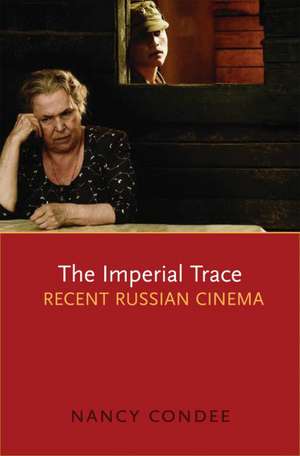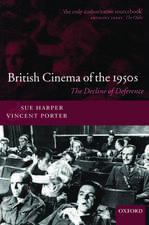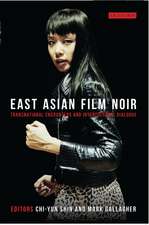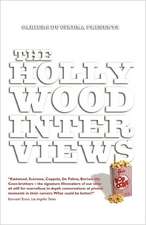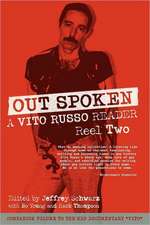The Imperial Trace: Recent Russian Cinema
Autor Nancy Condeeen Limba Engleză Paperback – 23 apr 2009
| Toate formatele și edițiile | Preț | Express |
|---|---|---|
| Paperback (1) | 268.64 lei 31-37 zile | |
| Oxford University Press – 23 apr 2009 | 268.64 lei 31-37 zile | |
| Hardback (1) | 450.78 lei 31-37 zile | |
| Oxford University Press – 8 oct 2009 | 450.78 lei 31-37 zile |
Preț: 268.64 lei
Nou
Puncte Express: 403
Preț estimativ în valută:
51.40€ • 53.81$ • 42.78£
51.40€ • 53.81$ • 42.78£
Carte tipărită la comandă
Livrare economică 19-25 martie
Preluare comenzi: 021 569.72.76
Specificații
ISBN-13: 9780195366969
ISBN-10: 0195366964
Pagini: 360
Ilustrații: 20 halftones
Dimensiuni: 157 x 231 x 23 mm
Greutate: 0.5 kg
Editura: Oxford University Press
Colecția OUP USA
Locul publicării:New York, United States
ISBN-10: 0195366964
Pagini: 360
Ilustrații: 20 halftones
Dimensiuni: 157 x 231 x 23 mm
Greutate: 0.5 kg
Editura: Oxford University Press
Colecția OUP USA
Locul publicării:New York, United States
Recenzii
The Imperial Trace is hands down the most thought-provoking book that I have read in quite some time. It is as well (and wittily) written as it is thoroughly researched and skillfully argued, no mean feat given the complexity of the ideas therein. This superb book is essential reading for anyone interested in nations and empire and their cultural manifestations, in Russian cultural politics, and in late Soviet and contemporary Russian film.
Offers some compelling interpretations for six of Russia's contemporary directors. This is greatly appreciated and provides a starting point for other such scholarly discussions...Condee provides much insight into late- and post-Soviet cinema, which will be a relevant source for future scholarship.
Imperial Trace provides insightful, always absorbing, sometimes provocative readings of the dialogue with the imperial legacy in the work of the six most significant film directors working in contemporary Russia.
This is a book full of surprises; rather than settling issues, it breaks open the discussion.
This study represents not only a superb overview and nuanced reading of works by major Russian filmmakers bridging the late Soviet and post-Soviet period, but also a groundbreaking study of the intersection between constructions of empire, cultural institutions, and cinematic texts.
Offers some compelling interpretations for six of Russia's contemporary directors. This is greatly appreciated and provides a starting point for other such scholarly discussions...Condee provides much insight into late- and post-Soviet cinema, which will be a relevant source for future scholarship.
Imperial Trace provides insightful, always absorbing, sometimes provocative readings of the dialogue with the imperial legacy in the work of the six most significant film directors working in contemporary Russia.
This is a book full of surprises; rather than settling issues, it breaks open the discussion.
This study represents not only a superb overview and nuanced reading of works by major Russian filmmakers bridging the late Soviet and post-Soviet period, but also a groundbreaking study of the intersection between constructions of empire, cultural institutions, and cinematic texts.
Notă biografică
Nancy Condee is on the Slavic and Film Studies faculty at the University of Pittsburgh. She has been Director of the Graduate Program for Cultural Studies for over a decade (1995-2006) and is a Senior Associate Member of St. Antony's College (Oxford University). She is co-founder and co-editor of the journal Studies in Russian and Soviet Cinema, and serves on a number of editorial and advisory boards, including Kinokultura, Critical Quarterly, and Russian Studies in Literature. She is a member of the Russian Guild of Cinema Scholars and Critics (Union of Cinematographers of the Russian Federation) and is one of two US scholars annually for over a decade invited to and supported by the Kinotavr Film Festival (Sochi), Russia's leading post-socialist film festival. She has served for six years as Chair of the Board of Directors of the National Council for Eurasian and East European Research, the largest US grant agency for social-science research in the former socialist bloc.
